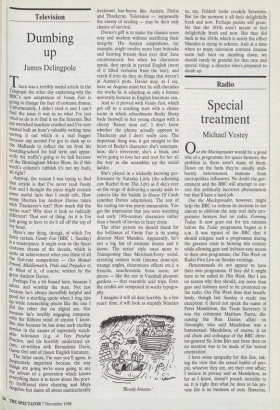Television
Dumbing up
James Delingpole
There was a terribly useful article in the Telegraph the other day explaining why the BBC's new adaptation of Vanity Fair is going to change the face of costume drama. Unfortunately, I didn't read it and I can't find the issue it was in so what I've just tried to do is to find it on the Internet. But my wretched machine crashed and I've now wasted half an hour's valuable writing time sorting it out which is a real bugger because any second I've got to dash up to the Midlands to collect the rat from his boarding-school for half term and appar- ently the traffic's going to be hell because Of the Birmingham Motor Show. So if this week's column's rubbish it's not my fault, all right?
Anyway, the reason I was trying to find that article is that I've never read Vanity Fair and I thought the piece might contain some useful facts that I could crib. How many liberties has Andrew Davies taken With Thackeray's text? How much did the series cost? Why does it look so radically different? That sort of thing. As it is I'm Just going to have to do it all off the top of my head.
Here's one thing, though, of which I'm fairly certain. Vanity Fair (BBC 1, Sunday) la a masterpiece. It might even be the finest costume drama of the decade, which is quite an achievement when you think of all the first-rate competition — Our Mutual Friend Middlemarch, Pride and Prejudice et al. Most of it, of course, written by the great Andrew Davies.
Perhaps I'm a bit biased here, because I adore and worship the man. Not just because he's always incredibly helpful and good for a startling quote when I ring him up while researching pieces like the one I did the other day on digital sex. Nor because he's terribly engaging company, With the filthiest mind of anyone I know. But also because he has done such sterling service in the causes of supremely watch- able television (e.g. A Very Peculiar Practice, and his horribly underrated sit- CO_ In, co-written with Bernadette Davis, wane On) and of classic English literature. , The latter cause, I'm sure you'll agree, is ue.aperately important because the way things are going we're soon going to see the advent of a generation which knows everything there is to know about Ibo poet- Y, traditional slave chanting and Maya Angelo but damn all about multiculturally irrelevant has-beens like Austen, Defoe and Thackeray. Television — supposedly the enemy of reading — may be their only chance of survival.
Davies's gift is to make the classics seem sexy and modern without sacrificing their integrity. His Austen adaptations, for example, might involve more bare buttocks and heaving breasts than ever dear Jane countenanced; but when his characters speak, they speak in period English (most of it lifted verbatim from the text), and rarely if ever do they do things that weren't in Austen's plots. Davies may, as I say, have an Augean mind but he still cherishes the works he is adapting as only a former university lecturer in English literature can.
And so it proved with Vanity Fair, which got off to a cracking start with a choice scene in which schoolmarm Becky Sharp bade farewell to her young charges with a cheery `Baisez mon mil'. I don't know whether the phrase actually appears in Thackeray and I don't really care. The important thing was, it got straight to the heart of Becky's character: she's unscrupu- lous; she's irreverent; she's a bitch; and we're going to love her and root for her all the way as she scrambles up the social ladder.
She's played in a wickedly knowing per- formance by Natasha Little (the scheming cow Rachel from This Life) as if she's ever on the verge of delivering a sneaky aside to camera like the baddie in House Of Cards (another Davies adaptation). The rest of the casting too was pretty immaculate. You got the impression that you were watching real early 19th-century characters rather than a bunch of luvvies in fancy dress.
The other person we should thank for the brilliance of Vanity Fair is its young director Marc Munden. Apparently, he's not a big fan of costume drama and it shows. The series' style owes more to Trainspotting than Merchant/Ivory: weird, arresting camera work (intense close-ups, strange angles, chiaroscuro effects etc.); a frenetic, anachronistic brass score; set pieces — like the one in Vauxhall pleasure gardens — that resemble acid trips. Even the credits are composed in wacky typogra- phy. I imagine it will all date horribly. In a few years' time, it will look as stupidly Nineties 'Bloody Joneses.' as, say, Poldarlc looks creakily Seventies. But for the moment it all feels delightfully fresh and now. Perhaps purists will grum- ble that the 1810s aren't meant to feel delightfully fresh and now. But they did back in the 1810s, which is surely the effect Munden is trying to achieve. And at a time when so many television costume dramas seem hell bent on dumbing down, we should surely be grateful for that rare and special thing: a director who's prepared to dumb up.


















































































 Previous page
Previous page